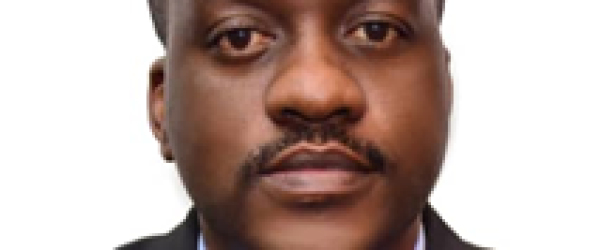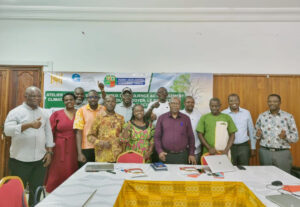As a prelude to the international workshop of reflection followed by the General Assembly of the Inades-Formation Network, the newspaper “La Lettre d’Inades-Formation (LIF)” conducted an interview with the President of the International Board of Directors, Mr. Rukundo Alexis. He tells us about his mandate, the prospects of the institution and his ambitions at the end of his first mandate. Enjoy your reading.
LIF: Mr. President, you were elected in 2019 and here you are at the end of your 1st term. What was your experience like?
The President’s responsibility within Inades-Formation requires availability and permanent commitment to the institution’s cause. I have already left with a strong desire to build on the achievements of the previous mandates and to add a touch that marks our presence as a team of the International Board of Directors (IBD) set up in 2019.
I learned the importance of effective and sincere communication in conducting business, especially when you have to base decisions and directions on reports and elements brought to your attention by the General Secretariat (GS) team. Delegation and follow-up have been the key words and thanks to the system put in place which allows the President of Inades-Formation Cote d’Ivoire to ensure the administrative aspects which normally fall to me in my capacity as President, no file has suffered from delay or lack of attention.
You must understand that the mandate that begins just before a pandemic such as Covid-19 has imposed new ways of acting with the introduction of online meetings and the adaptation of intervention approaches to ensure the continuation of programs in the network while respecting all barriers to protect both our teams and our partners in the field.
LIF: What is your assessment of these three years at the head of the Inades-Formation network? What were the highlights of this mandate?
The balance sheet remains positive despite the difficult conditions in which the mandate was exercised. Above all, we have ensured the formation of a team and promoted a spirit of trust and proximity between the members of the IAC on the one hand and between the President and the Secretary General on the other.
I believe that every achievement, no matter how small, has been the result of collaboration and our system of action is based on a philosophy of collegiality in conception and solidarity in action, resulting in shared responsibilities and joys.
The introduction of an element of performance monitoring of the General Secretariat team with an emphasis on internal dialogue around the results, the permanent technical support of the National Associations (NAs) and National Offices (NOs) which saw the introduction of visits by the President to the NAs to exchange with the Local Administrative Councils (LACs) and staff on the Inades-Formation identity, the relationship between the International Association and the national associations, governance in the network and its challenges in a context of progressive empowerment, regional solidarity between National Associations (NAs), etc.
We have also, as part of the implementation of a resolution of the International General Assembly (IGA) 2019, developed a policy of expansion / extension of the network Inades-Formation and informally undertook the prospecting to assess the demand in the various countries of Africa, so that after its adoption by the IGA-2022, it is immediately implemented for a presence and wider visibility
Partnership agreements with embassies and international organizations based in Abidjan and participation in regional forums are a sign of a greater openness that aims to highlight our contribution and enhance our experience in the field of development in Africa.
At the level of the organization’s assets, we have pursued the reflection that aims at a more rational fructification of the financial assets of the institution through a diversification of investments. To this end, a specific internal policy has been adopted, which is a visible sign of greater openness in respecting the required standards of prudence. The follow-up of the construction of the new headquarters was also one of the priorities and we are pleased that the inauguration of this building will soon take place despite the challenge of access, which remains a subject that will be pursued beyond the present mandate, especially with the authorities in charge of urban development in Abidjan. We do not forget the securing of the Yamoussoukro property and the beginning of the reflections for its valorisation in the framework of a professional training project which aims at the African youth in general and the Ivorian youth in particular.
LIF: What did not work so well and should be strengthened in the next term?
I only have to say that despite the abundance of projects of the first mandate, we are still thirsty to see all the policies that have been adopted, begin to be implemented. The 2019-2022 mandate is focused on building a team and creating the conditions for real action.
The new mandate will have to see more outputs and concrete actions in the reception of new national associations, the concretization of the project of valorization of the property of Yamoussoukro, the inauguration and the occupation of the new buildings of the SG and the beginning of the phase-2 of the works, the introduction of the alternative solutions of investment, the continuation of the accompaniment of the NAs for an internalization of the philosophy and the approaches promoted by the Inades-Formation family. Particular emphasis should be placed on more effective communication with the external world at both the SG and National Office levels.
LIF: The next AGI is scheduled for late November 2022 in Côte d’Ivoire, how is the organization and at what level?
The organization of the AGI is going well and we are in the standards of time with the budget of this activity already adopted, the reservation since June 2022 of the Belle Cote hotel which is the place where the works will be held, the invitations launched with a precise agenda, the choice of the delegates of the NA and the exchange by the associated members of the NA on the themes of the AGI which are already completed. The SG team and the National Association of Côte d’Ivoire are working together on practical aspects of the AGI and other related work and I am personally informed of what is going on.
LIF: The main theme of the AGI is “Which prospective for the horizon 2040 at Inades-Formation”, in your opinion, what are the themes on which Inades-Formation should position itself to better contribute to the common good?
In my opinion, the continuation of Inades-Formation’s effort to position itself to contribute to the common good involves, in particular, themes such as: participatory governance, territorial development, inclusive development, ecosystem restoration and agroecological transition, family farming, and the repositioning of sovereignty foods, climate change, community microfinance, etc.
LIF: The second theme that will be discussed at the international conference preceding the AGI is agricultural training. Why such a theme?
This theme was initiated in a general framework of a remarkable absence of public policies of ambitious, structured and coherent agricultural and rural vocational training in the face of the real needs of professional integration of young people in rural areas and of the continuous training of farmers.
Under the impetus of the World Bank, the process of renovating national agricultural and rural training strategies (SNFAR) was initiated in the 2000s and, at the operational level, a strong commitment was expressed by certain States and their international partners to develop agricultural and rural training systems with substantial support.
It is therefore in view of this openness of States and technical and financial partners that, with its experience in the field and its desire to contribute to the development of Africa by contributing its entire arsenal of approaches and tools, Inades-Formation wants to put training back at the heart of the debates within the network in order to give it a new impetus. It will be a question of initiating the debate on the appropriate mechanisms to renovate and amplify the agricultural and rural training offers and to carry out reflections on the repositioning of the training engineering which, in the past, made Inades-Formation, a reference institution.
LIF: How many participants should we expect for this AGI?
The AGI-2022 will receive 44 participants, distributed as follows: 13 members of the International Board of Directors, 10 representatives of the National Associations elected by the National Associates – one person per NA and 21 delegates of the National Associations elected by the colleges of international associates, resident in the respective ten (10) countries of location.
In addition to this number, there will be guests (partners and Ivorian authorities), resource persons, some associated members of Inades-Formation Côte d’Ivoire who will participate in the international conference organized on the sidelines of the AGI. The staff of the General Secretariat and the National Office of Inades-Formation Côte d’Ivoire will be heavily involved in the technical and logistical organization.
LIF: Without being intrusive, since the association’s texts allow it, would you like to run for a second term?
I understand the environment better and I still feel strength, commitment and courage. At this time, I see no reason not to submit my desire to serve to the appreciation of the members of Inades-Formation at the AGI-2022.










